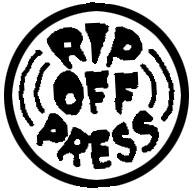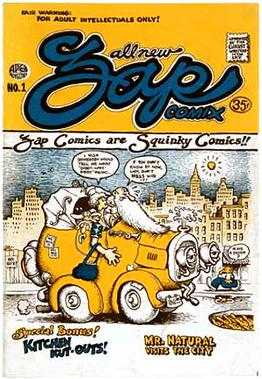
Underground comix are small press or self-published comic books that are often socially relevant or satirical in nature. They differ from mainstream comics in depicting content forbidden to mainstream publications by the Comics Code Authority, including explicit drug use, sexuality, and violence. They were most popular in the United States in the late 1960s and 1970s, and in the United Kingdom in the 1970s.

The Fabulous Furry Freak Brothers is an underground comic about a fictional trio of stoner characters, created by the American artist Gilbert Shelton. The Freak Brothers first appeared in The Rag, an underground newspaper published in Austin, Texas, beginning in May 1968, and were regularly reprinted in underground publications around the United States and in other parts of the world. Later their adventures were published in a series of comic books.
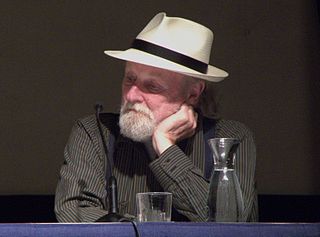
Gilbert Shelton is an American cartoonist and a key member of the underground comix movement. He is the creator of the iconic underground characters The Fabulous Furry Freak Brothers, Fat Freddy's Cat, and Wonder Wart-Hog.
Paul Mavrides is an American artist, best known for his critique-laden comics, cartoons, paintings, graphics, performances and writings that encompass a disturbing yet humorous catalog of the social ills and shortcomings of human civilization. Mavrides worked with underground comix pioneer Gilbert Shelton on The Fabulous Furry Freak Brothers from 1978 to 1992. Mavrides has been noted for "adding new dimensions to the political comic" in the underground comix press of the 1970s and '80s.
Frank Huntington Stack is an American underground cartoonist and fine artist. Working under the name Foolbert Sturgeon to avoid persecution for his work while living in the Bible Belt, Stack published what is considered by many to be the first underground comic, The Adventures of Jesus, in 1964.
Knockabout Comics is a UK publisher and distributor of underground and alternative books and comics. They have a long-standing relationship with underground comix pioneer Gilbert Shelton.
Jack Edward Jackson, better known by his pen name Jaxon, was an American cartoonist, illustrator, historian, and writer. He co-founded Rip Off Press, and some consider him to be the first underground comix artist, due to his most well-known comic strip God Nose.

Wonder Wart-Hog is an underground comic book character, a porcine parody of Superman, created by American cartoonist Gilbert Shelton and first published in 1962. Over the years, Shelton has worked on the strip in collaboration with various writers and artists, including fellow UT Austin alums Tony Bell, Bill Killeen, and Joe E. Brown Jr.
Jay Kinney is an American author, editor, and former underground cartoonist. Kinney has been noted for "adding new dimensions to the political comic" in the underground comix press of the 1970s and '80s.
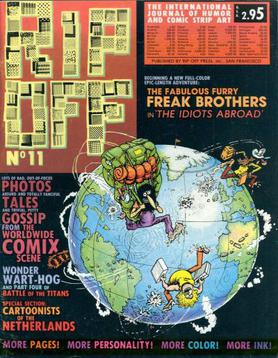
Rip Off Comix was an underground comix anthology published between 1977 and 1991 by Rip Off Press. As time passed, the sensibility of the anthology changed from underground to alternative comics.
Up in Flames is a 1978 pornographic film and unauthorized adaptation of the underground comix The Fabulous Furry Freak Brothers by Gilbert Shelton and Mr. Natural by Robert Crumb. The film's title also parodies the contemporaneous Cheech & Chong movie Up in Smoke.
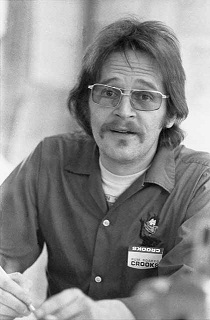
Dave Sheridan was an American cartoonist and underground comix artist. He was the creator of Dealer McDope and collaborated with Gilbert Shelton and Paul Mavrides on The Fabulous Furry Freak Brothers. As creative partner with fellow underground creator Fred Schrier, using the name "Overland Vegetable Stagecoach," they worked on Mother's Oats Funnies, published by Rip Off Press from 1970 to 1976.
Fred Schrier is an artist, writer, and animator, best known as partner to the underground comic book artist Dave Sheridan. Together, using the name "Overland Vegetable Stagecoach," they worked on Mother's Oats Comix, published by Rip Off Press from 1970 to 1976.
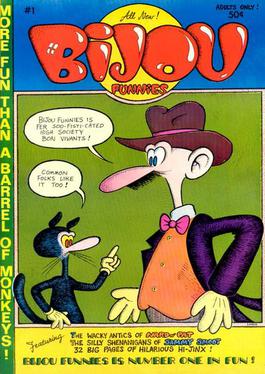
Bijou Funnies was an American underground comix magazine which published eight issues between 1968 and 1973. Edited by Chicago-based cartoonist Jay Lynch, Bijou Funnies featured strong work by the core group of Lynch, Skip Williamson, Robert Crumb, and Jay Kinney, as well as Art Spiegelman, Gilbert Shelton, Justin Green, and Kim Deitch. Bijou Funnies was heavily influenced by Mad magazine, and, along with Zap Comix, is considered one of the titles to launch the underground comix movement.
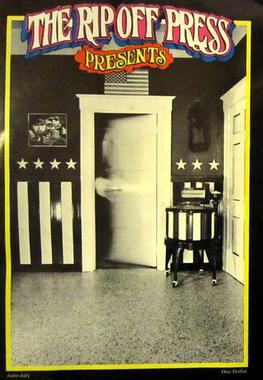
The Rip Off Review of Western Culture was an underground comics magazine published by Rip Off Press and produced out of San Francisco, California. It published three issues in 1972. The publication was historically significant in that it brought together the work of many noteworthy underground artists and writers.
Theodore Richards was an American web designer and cartoonist, best known for his underground comix.

Feds 'N' Heads is an underground comic book, created and self-published by Gilbert Shelton, which introduced the world to the Shelton characters Wonder Wart-Hog and The Fabulous Furry Freak Brothers. In the spring of 1968, cartoonist Gilbert Shelton, already somewhat known in college humor and underground comix circles for his Superman parody Wonder Wart-Hog, self-published a 28-page one-shot, Feds 'N' Heads Comics, much of the material of which had previously appeared in the Austin, Texas, underground paper The Rag. Feds 'N' Heads was later reprinted an additional 13 times by the Bay Area underground publisher the Print Mint, selling over 200,000 total copies by 1980.

Slow Death is an underground comix anthology published by Last Gasp, the first title published by the San Francisco Bay Area-based press. Conceived as an ecologically themed comics magazine, the title's "underlying theme was always about what the human race was doing to damage the native planet." Frequent contributors to Slow Death included Greg Irons, Jaxon, Dave Sheridan, Richard Corben, Jim Osborne, Tom Veitch, and Dennis Ellefson. Released sporadically from 1970 to 1992, 11 issues were published in all.

Young Lust is an underground comix anthology that was published sporadically from 1970 to 1993. The title, which parodied 1950s romance comics such as Young Love, was noted for its explicit depictions of sex. Unlike many other sex-fueled underground comix, Young Lust was generally not perceived as misogynistic. Founding editors Bill Griffith and Jay Kinney gradually morphed the title into a satire of societal mores. According to Kinney, Young Lust "became one of the top three best-selling underground comix, along with Zap Comix and The Fabulous Furry Freak Brothers".
Harry Driggs was an American artist, graphic designer, political activist, and underground cartoonist. Much of his comix work was published under the name R. Diggs. Driggs was a longtime resident of San Francisco, where he worked in advertising as a graphic designer and art director.
